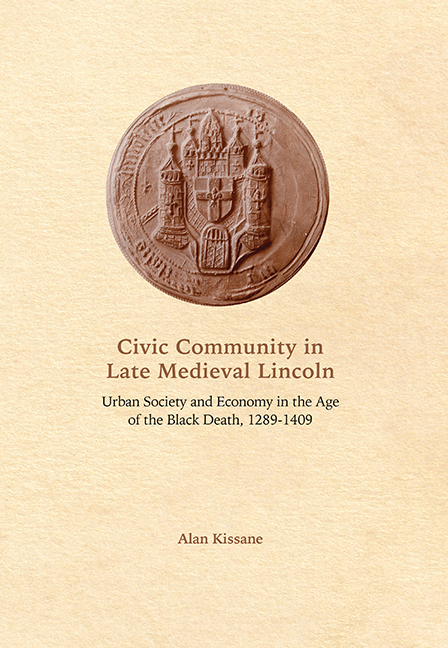 Civic Community in Late Medieval Lincoln
Civic Community in Late Medieval Lincoln Book contents
- Frontmatter
- Contents
- List of Illustrations
- Acknowledgements
- Abbreviations and Note on the Text
- Introduction
- 1 Urban Foundations: Occupational Structure
- 2 Lincoln as Entrepôt: Tolls, Trade and Credit
- 3 The Crown and the Fee Farm
- 4 The Growth of Civic Government
- 5 Fraternity, Orthodoxy and Communal Cooperation
- 6 Chantry Founders, Commemoration and the Rental Market
- Conclusion
- 1 Appendix 1: Occupational Sources and Data
- 2 Appendix 2: Lincoln Civic Officials, 1289-1409
- 3 Appendix 3: Lincoln Members of Parliament, c.1290-1410
- 4 Appendix 4: The Fraternal Year
- 5 Appendix 5: Perpetual Chantry Foundations
- Bibliography
- Index
2 - Lincoln as Entrepôt: Tolls, Trade and Credit
Published online by Cambridge University Press: 27 April 2017
- Frontmatter
- Contents
- List of Illustrations
- Acknowledgements
- Abbreviations and Note on the Text
- Introduction
- 1 Urban Foundations: Occupational Structure
- 2 Lincoln as Entrepôt: Tolls, Trade and Credit
- 3 The Crown and the Fee Farm
- 4 The Growth of Civic Government
- 5 Fraternity, Orthodoxy and Communal Cooperation
- 6 Chantry Founders, Commemoration and the Rental Market
- Conclusion
- 1 Appendix 1: Occupational Sources and Data
- 2 Appendix 2: Lincoln Civic Officials, 1289-1409
- 3 Appendix 3: Lincoln Members of Parliament, c.1290-1410
- 4 Appendix 4: The Fraternal Year
- 5 Appendix 5: Perpetual Chantry Foundations
- Bibliography
- Index
Summary
Located atop a steep limestone ridge amid the otherwise flat lands of the fens, the city of Lincoln was throughout much of the Middle Ages accessible by boat via the river Witham, which exited at the Wash to the south-east, and the Fossdyke, a Roman canal connecting Lincoln directly to the North Sea via the rivers Trent and Humber. Two major roads also connected the city to the wider world, alongside a network of minor roads providing easy access to the surrounding hinterland (map 3). These were Ermine Street, which bisected the city along a north-south axis and ran directly southwards to London, and Fosse Way, which, according to Henry of Huntingdon writing in the twelfth century, passed directly ‘through Lincoln’ and provided access to south-west of England. Such routes of communication and trade remained vital to the economic wellbeing of the city and surrounding areas, as it was in Lincoln that an array of goods and raw materials could be bought and sold.
This chapter explores Lincoln's trade and credit networks and aims to answer the following questions: how central was Lincoln to regional and international patterns of trade? How did legislative changes in the sale and distribution of wool impact upon the city's economy and the business decisions of merchants during years of growth and recession? How extensive were networks of credit in the city and region? And to what extent did bouts of plague and famine influence these patterns?
Tolls and Trade
The right to sell goods and raw materials in Lincoln's marketplaces was granted to two types of individual: those liable to pay tolls and those legally exempt. The former group included denizen non-citizens, including petty traders and craftsmen, and those from surrounding towns and villages; the latter, citizens who, as franchised members of the community, were free from all tolls in the city and elsewhere,were granted rights of pasture in the common fields of the city and were eligible to serve in civic office, along with merchants and traders from other towns who held priority of seisin (i.e. a charter pre-dating that of the town they wished to trade in). For those liable to toll, goods were assessed at various collection points both within and without the city's walls, with tolls being recorded and preserved for accounting purposes.
- Type
- Chapter
- Information
- Civic Community in Late Medieval LincolnUrban Society and Economy in the Age of the Black Death, 1289-1409, pp. 50 - 92Publisher: Boydell & BrewerPrint publication year: 2017


